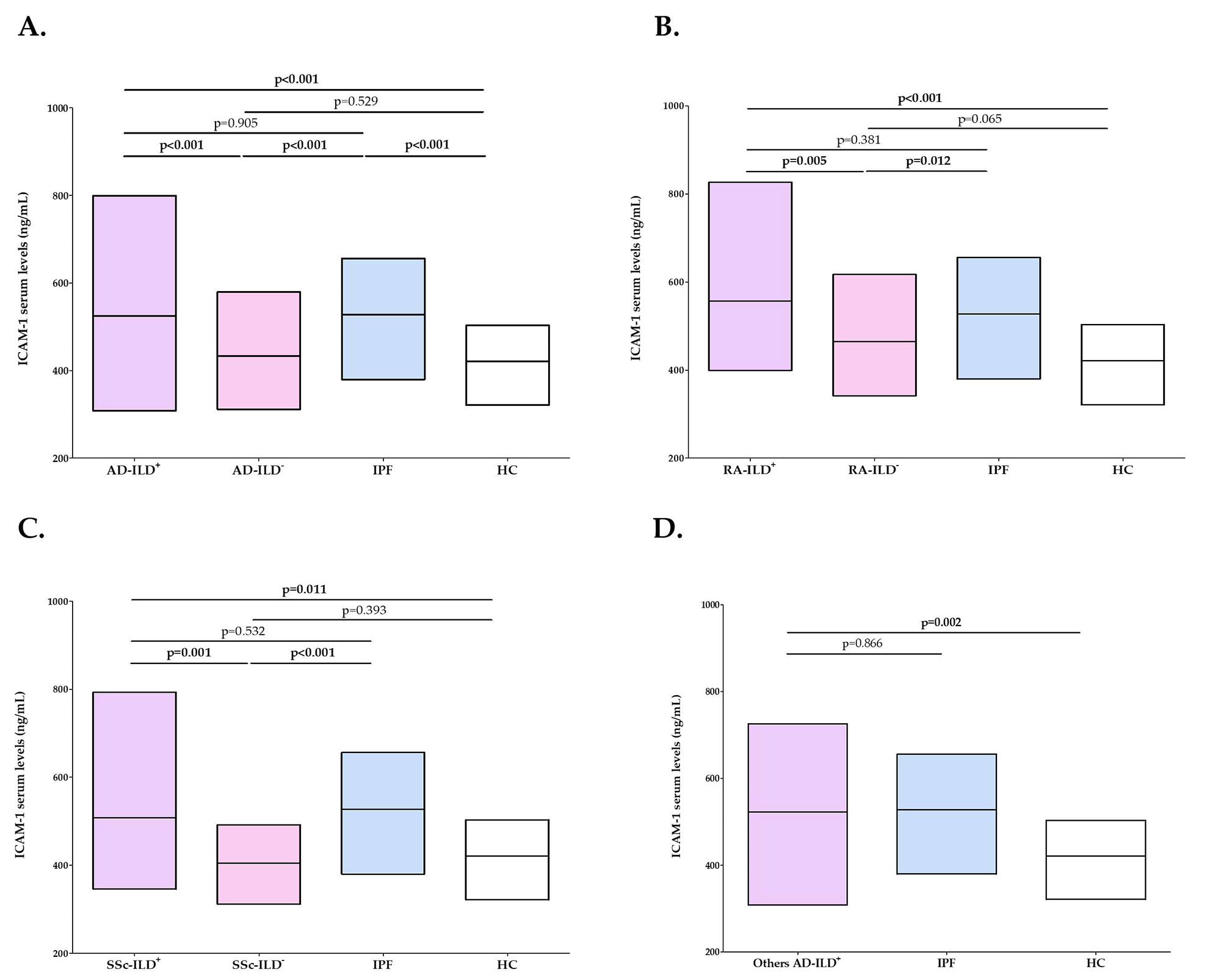Session Information
Session Type: Poster Session B
Session Time: 9:00AM-10:30AM
Background/Purpose: Intercellular adhesion molecule-1 (ICAM-1) regulates leukocyte recruitment from circulation to sites of inflammation, being considered as a marker of underlying endothelial damage [1]. Moreover, ICAM-1 contributes to the development of interstitial lung disease (ILD) and it has been proposed as a prognostic biomarker in idiopathic pulmonary fibrosis (IPF) [2]. Although ILD is one of the main causes of death in patients with autoimmune diseases (AD), mainly in RA and SSc [3], studies on the involvement of ICAM-1 in AD-ILD are scarce. Accordingly, the objective of this work was to elucidate the role of ICAM-1 in the pathological processes of both underlying vascular damage and pulmonary fibrosis in AD-ILD.
Methods: Peripheral venous blood was collected from a total of 144 individuals. Specifically, 57 patients with AD‐ILD+ were recruited: 21 with RA‐ILD+, 21 with SSc‐ILD+ and 15 with other AD‐ILD+. Moreover, we recruited different comparative groups: 45 AD‐ILD− patients (25 RA‐ILD− and 20 SSc‐ILD−); 21 IPF patients; and 21 healthy controls (HC). Serum levels of ICAM-1 were measured by enzyme-linked immunosorbent assay.
Results: Patients with AD-ILD+ exhibited significantly higher ICAM-1 levels than AD-ILD– patients (p< 0.001, Figure 1A). Specifically, RA-ILD+ and SSc-ILD+ patients showed higher levels of ICAM-1 than their ILD– counterparts (p=0.005 and p=0.001, respectively, Figure 1B-C). Furthermore, an increase of ICAM-1 levels was also found in AD-ILD+ patients when compared with HC (p< 0.001, Figure 1A). Likewise, patients with RA-ILD+, SSc-ILD+ and other AD-ILD+ showed higher ICAM-1 levels than HC (p< 0,001, p=0,011 and p=0,002, respectively, Figure 1B-C). However, no difference was observed between AD-ILD+ patients, regardless the underlying AD, and those with IPF (Figure 1A-D).
Conclusion: Our study supports a role of ICAM-1 in the lung damage of AD-ILD+, being the increase of ICAM-1 linked to the presence of ILD in patients with RA and SSc.
References: [1] J Leukoc Biol 2020;108(3):787-799; [2] Eur Respir J 2019;54(3):1900295; [3] Expert Rev Clin Immunol 2018;14(1):69-82.Personal funds, VP-C and SR-M: RD16/0012/0009(ISCIII-ERDF); FG: RICORS Program (RD21/0002/0025) (ISCIII-EU); RL-M: CP16/00033 (ISCIII-ESF).
To cite this abstract in AMA style:
Pulito-Cueto V, Remuzgo-Martinez S, Genre F, Atienza-Mateo B, Iturbe-Fernández D, Mora-Cuesta V, Lera-Gómez L, Prieto-Peña D, Portilla V, Blanco R, Gualillo O, Corrales A, Cifrián J, Lopez Mejias R, González-Gay M. Increase of Intercellular Adhesion Molecule-1 Linked to Lung Damage of Interstitial Lung Disease in Patients with Autoimmune Diseases [abstract]. Arthritis Rheumatol. 2022; 74 (suppl 9). https://acrabstracts.org/abstract/increase-of-intercellular-adhesion-molecule-1-linked-to-lung-damage-of-interstitial-lung-disease-in-patients-with-autoimmune-diseases/. Accessed .« Back to ACR Convergence 2022
ACR Meeting Abstracts - https://acrabstracts.org/abstract/increase-of-intercellular-adhesion-molecule-1-linked-to-lung-damage-of-interstitial-lung-disease-in-patients-with-autoimmune-diseases/

